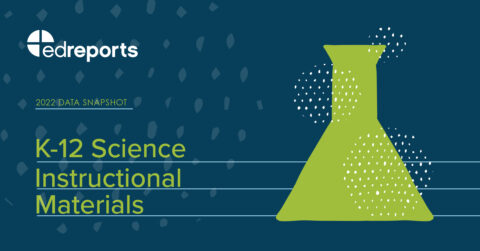Watch: How to Help High School Science Teachers Get Better Curriculum
Science educator Shannon Wachowski discusses how EdReports’ reviews of high school science programs can support educators.
Related Resources
article
Data Snapshot: K-12 Science Instructional Materials (2022)
Learn more about the availability and use of high quality K-12 science curriculum in this new report.
article
Why I Review: I Have the Power to Shape Current and Future Instructional Materials
High school science educator Katie Miller shares why she’s committed to look beyond the needs of her school and toward the opportunity and charge to improve science education for all students, all teachers, and all schools.
article
3 Ways to Know if You’re Using Quality Science Materials
Science educator Lacey Wieser shares three ways to identify if you’re using high-quality science materials in your classroom.


